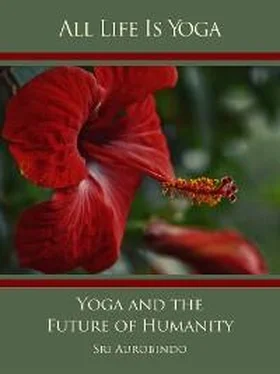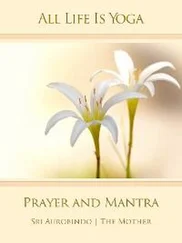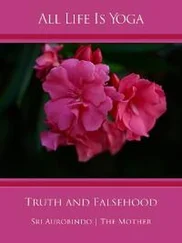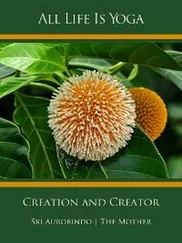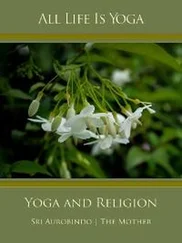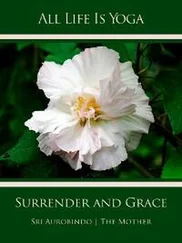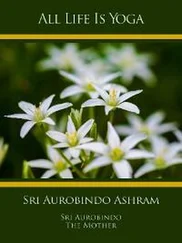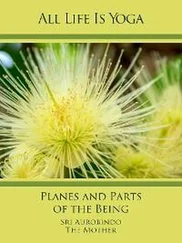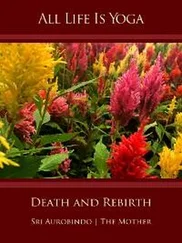Sri Aurobindo - All Life Is Yoga - Yoga and the Future of Humanity
Здесь есть возможность читать онлайн «Sri Aurobindo - All Life Is Yoga - Yoga and the Future of Humanity» — ознакомительный отрывок электронной книги совершенно бесплатно, а после прочтения отрывка купить полную версию. В некоторых случаях можно слушать аудио, скачать через торрент в формате fb2 и присутствует краткое содержание. Жанр: unrecognised, на английском языке. Описание произведения, (предисловие) а так же отзывы посетителей доступны на портале библиотеки ЛибКат.
- Название:All Life Is Yoga: Yoga and the Future of Humanity
- Автор:
- Жанр:
- Год:неизвестен
- ISBN:нет данных
- Рейтинг книги:3 / 5. Голосов: 1
-
Избранное:Добавить в избранное
- Отзывы:
-
Ваша оценка:
- 60
- 1
- 2
- 3
- 4
- 5
All Life Is Yoga: Yoga and the Future of Humanity: краткое содержание, описание и аннотация
Предлагаем к чтению аннотацию, описание, краткое содержание или предисловие (зависит от того, что написал сам автор книги «All Life Is Yoga: Yoga and the Future of Humanity»). Если вы не нашли необходимую информацию о книге — напишите в комментариях, мы постараемся отыскать её.
All Life Is Yoga: Yoga and the Future of Humanity — читать онлайн ознакомительный отрывок
Ниже представлен текст книги, разбитый по страницам. Система сохранения места последней прочитанной страницы, позволяет с удобством читать онлайн бесплатно книгу «All Life Is Yoga: Yoga and the Future of Humanity», без необходимости каждый раз заново искать на чём Вы остановились. Поставьте закладку, и сможете в любой момент перейти на страницу, на которой закончили чтение.
Интервал:
Закладка:
Therefore Nature, still following her upward surge, has provided a mightier rank of human souls who are capable of going forward beyond this preliminary effort and having entered into the very being of God, of dwelling there in beatitude. Entering into the consciousness of the Infinite, feeling it all around them and in them, ever thrilling with its touch, aware of identity with It in nature, joy and inner awareness, they yet preserve a constant separateness of their special being in that identity. They do not plunge themselves wholly into the divine ocean or, if they go down into it, they keep hold on a fathomline which will preserve their touch with the surface. In their nature – whatever be their opinions – such men are Visishtadwaitins, souls not drawn towards entire oneness. But unless man plunges himself wholly into God caring not whether he re-emerge, unless the human sacrifices himself wholly to the divinity, keeping back no particle of his being, not even the least particle of separateness of the individual ego, jivatman, the divine purpose in man cannot be utterly accomplished. Therefore Nature or the Will of God – for Nature is nothing but the Will of God in action – has provided that some, having indwelt in God, human soul in divine soul, shall be irresistibly called immediately, with brief respite or at long and last to the utter immersion. These go onward and throw away the last trace of Ego into God. Some of us, it has been said by a great teacher, are jivakotis, human beings leaning so pre-eminently to the symbol-nature that, if they have lost it utterly for a while in the Reality, they lose themselves; once immersed, they cannot return; they are lost in God to humanity; others are ishwarakotis, human beings whose centre has already been shifted upwards or, elevated in the superior planes of our conscious-existence from the beginning, was established in God rather than in Nature. Such men are already leaning down from God to Nature; they, therefore, even in losing themselves in Him yet keep themselves since in reaching God they do not depart from their centre but rather go towards it; arrived they are able to lean down again to humanity. Those who can thus emerge from this bath of God are the final helpers of humanity and are chosen by God and Nature to prepare the type of supernatural man to which our humanity is rising.
There are, then, these three divine conditions, states separately conceived of humanity’s God attainment. Man being limited in energy and discriminative rather than catholic in intellect, fastens usually on this separate conception and limits himself to one or other of these conditions; Yogic method, also, being careful of the different natures of men, suits itself to their limitations, becomes selective and concentrates upon one of these conditions or another. Or even it becomes partial as well as selective; for in its contact with God, it relates itself to a part of divine quality rather than the perfect divinity, to a God of mercy, the God of Justice, the Divine Master, the Divine Friend, or else with some aspect of divine impersonal being, to Infinite Rapture, to Infinite Force or to Infinite Calm and Purity. In the indwelling there may be the same limitations, in the becoming also they may persist. There is no fault to be found with this selective process or with this partiality. They are necessary; human limitations demand this device; human perfectibility itself finds its account in these concessions. Nature knows her task and she proceeds to it with a wide, flexible and perfect wisdom which smiles at our impatient logical narrownesses and rigid, one-sighted consistencies. She knows she has an infinitely complex and variable material to deal with and must be infinitely complex and variable in her methods. We only consider precise method and ultimate fulfilment; she has to reckon on her way with thousand-armed struggles and infinite possibilities.
Nevertheless, her ultimate aim and the perfect and comprehensive Yoga is that which embraces rather than selects. We are meant to be within the symbol of humanity what God is in Himself and universally. Now God is free, absolute from these limitations and all-comprehensive. He is always one in his being, yet both one with and separate from his symbols and in that differentiated oneness able to stand quite apart from them. So we too in our ultimate divine realisation when we have become one with our divine Self, may and should be able also to stand out as the self still one in all things and beings, yet differentiated in the symbol, so as to enjoy a blissful divided closeness such as that of the Lover and Beloved mingling yet separate in their rapture; and may and should even be able to stand away from God with a sort of entire separateness holding His hand still, unlike the pure dualist, but still standing away from Him so that we may enjoy that infinity of human relation with God which is the wonder and beauty and joy of dualistic religions. To accomplish this is the full, the purna Yoga, and the sadhak who can attain to it, is in his condition the complete Yogin.
Is such a triune condition of the soul possible? Logically, it would seem impossible; logically, all trinities are chimeras and a thing must be one thing at a time and cannot combine three such divergent states as oneness, differentiated oneness and effective duality. But in these matters an inch of experience runs farther than a yard of logic, and experience, you will find, affirms that the triune God-state is perfectly possible and simple once you have attained God’s fullness. We must not apply to the soul a logic which is based on the peculiarities of matter. It is true of a clod that it cannot be at the same time a clod hanging up or pasted on some bough, a clod protruding from the earth and a shapeless mass trodden into the mother soil. But this is because the clod is divided from the earthly form. The soul is not divided from God by these barriers of material and dimension. What is true of matter is not true of Spirit, nor do the standards of form become facts applied to the formless. For matter is conscious being confined in form, the spirit is conscious being using form but unconfined in it; and it is the privilege of Spirit that though indivisible in its pure being, it is freely self-divisible in its conscious experience and can concentrate itself in many states at a time. It is by this tapas, by this varied concentration of self-knowledge that Divine Existence creates and supports the world and is at one and the same time God and Nature and World, Personal and Impersonal, Pure and Varied, Qualitied and without Qualities, Krishna and Kali, Shiva and Brahma and Vishnu, man and animal and vegetable and stone, all aspects of Himself and all symbols. We need not doubt therefore that we, recovering our divine reality, shall not be bound to a single condition or aspect but can command a triune or even a multiple soul-experience. We, becoming God, become that which is the All and exceeds and transcends the All. Sarvabhutani atmaivabhud vijanatah. The soul of the perfect knower becomes all existent things and That transcendental in which all things have their existence, ihaiva, without ceasing to possess his human centre of separate experience. For this is the entire divinity that is the result of the perfect and comprehensive Yoga.
* * *
Chapter 6
Sachchidananda
The Vedanta, that solemn affirmation of the ultimate truths beyond which no human thinking has ever proceeded or can proceed, looking deep into the last recesses where existence takes refuge from the scrutiny of the Mind, affirms there as the beginning and the end of all possible description of the infinite Knowable-Unknowable three terms, Being, Comprehension and Delight. They are the initial and final trinity of existence. From them all phenomena proceed, to them all phenomena seek to return. This personality envisaged as myself, has come out of infinite being, lives in infinite being; emmeshed in the limitations of form and idea it seeks laboriously to recover itself as the infinite being. This Awareness in me which centralised in my personality suffers and examines all impressions that reach me out of the infinite existence, is a selection from an infinite Awareness contemplating itself in its whole and its parts; localised and limited, involved at first in this form it has created, it emerges out of its creation and seeks first to comprehend that and then to comprehend itself; master in some sort of its surroundings, it seeks to become master of itself; enlarging always from the factor to the sum, from the particular to the general, from the form to the essence it seeks to recover itself as the infinite self-comprehension. This Will to be and know in myself is essentially the joy of being and the joy of comprehending – Ananda, Delight; and the particular delight in me is but a spark, a wave, a foam-crest of an infinite delight; fastened at first on partial, limited and transient pleasures, it seeks always to enlarge them, to combine, to intensify; it goes out seeking for new forms of happiness; it goes in turning from the vital joy to sense-delights, from sense-delights to pleasures of emotion, from pleasures of emotion to intellectual satisfaction, from intellectual satisfaction to the self-existent bliss of the spirit which depends on no object or circumstance; in all these motions it is seeking to recover itself as infinite Delight. In this way the final perceptions of Vedanta explain the whole process and labour of consciousness in the world.
Читать дальшеИнтервал:
Закладка:
Похожие книги на «All Life Is Yoga: Yoga and the Future of Humanity»
Представляем Вашему вниманию похожие книги на «All Life Is Yoga: Yoga and the Future of Humanity» списком для выбора. Мы отобрали схожую по названию и смыслу литературу в надежде предоставить читателям больше вариантов отыскать новые, интересные, ещё непрочитанные произведения.
Обсуждение, отзывы о книге «All Life Is Yoga: Yoga and the Future of Humanity» и просто собственные мнения читателей. Оставьте ваши комментарии, напишите, что Вы думаете о произведении, его смысле или главных героях. Укажите что конкретно понравилось, а что нет, и почему Вы так считаете.
